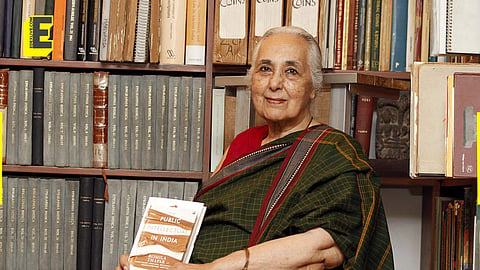
- News
- Campus
- Exam
- Podcast
- Web Stories
- Do You Know
- Path Finders - UG Programs
- Videos
- Book Review

Romila Thapar, speaking at the third Kapila Vatsyayan Memorial Lecture at the India International Centre on Tuesday, September 16 expressed alarm over the decline of Jawaharlal Nehru University (JNU), and other social science centers over the past decade. She noted that those who helped establish these institutions are shocked by their "decimation," reported PTI.
"Some of us who were involved in establishing JNU in the 1970s have been appalled by the decimation that it has undergone in the last 10 years. This is not confined to JNU alone, as other strong centres of the social sciences have also suffered," Thapar said.
Erosion of academic standards
Thapar highlighted the challenges in maintaining academic excellence at JNU, describing the situation as "extremely problematic." She pointed to several factors undermining quality, including the appointment of substandard faculty and restrictions on academic freedom.
"But in the last decade, maintaining academic standards has been made extremely, to put it politely, problematic. This was done in various ways, through appointing some substandard faculty, non-professionals dictating the curriculum and syllabi, attempts to rescind the earlier appointed professor emeritus, curtailing freedom to research and teach what academics regard as meaningful," the historian said.
Violence and political control
Referencing the January 2020 incident where an armed mob attacked JNU’s campus, injuring students and faculty, Thapar remarked that the situation "went beyond academic mechanism." She also addressed the arrest of students, implicitly referring to Umar Khalid, who has been detained for six years without trial.
"There have been arrests of students for criticising authority, and some of those arrested are still in jail without a trial, despite being there for the last six years. Intellectually purposeful education requires thinking with freedom... or is this control just another demonstration of the prevalent preference for anti-intellectualism. Speech can be silenced, but thought cannot be stilled," the historian said. She added that "political control over education silences intellectual creativity."
Flaws in history education
Thapar criticised the "current methods of history education" in India, noting that history is vulnerable due to widespread lack of historical knowledge. She argued that the social sciences, particularly history, are susceptible to manipulation.
"It is unacceptable to professional historians, but it is acceptable to the members of the public who, in turn, quote it perhaps because of the generally scant knowledge of history in this country. The sciences, being more technical, are not fantasised. The social sciences analyse how societies function and are therefore less technical and more vulnerable. And history is an easy prey," Thapar said.
Revival of colonial narratives
The historian, author of Early India: From the Origins to AD 1300, condemned the return to "discarded colonial theories" in history teaching, which she argued falsely claims to be decolonisation. She criticised the "Hindutva version" of history that promotes colonial ideas like Aryan superiority and the Two-Nation Theory.
"This is not the decolonisation that it claims to be, since it supports colonial teachings. This supposedly new history claims to replace what others have been writing and teaching in the last 75 years in post-colonial times, much of which is conveniently labelled Marxist, thus said to be erroneous and dismissed," she said. Thapar questioned, "Can a society as diverse as India be reduced to having a single uniform heritage?"
Threat to Indian pluralism
Thapar warned that promoting a singular narrative undermines India’s democratic and pluralistic ethos. She challenged the imposition of a uniform cultural identity.
"Singular majoritarianism contradicts democracy, as also does acquiescence with the hierarchy of caste. This concerns the basic question of Indian pluralism: will we still be able to nurture a society whose parameters are open to debate and discussion? Are we willing to confine our society to a single uniform way of living and thinking? Will there only be one explanation of the past and all others dismissed? Is culture going to be defined by the culture idiom of the dominant community, will variants be disallowed?" she questioned.
Need for reliable education
Thapar emphasised the importance of accurate and reliable history education, free from political manipulation. She stressed the role of competent teachers in encouraging critical thinking among students. "There was a time when students in state schools were given an education that had some degree of quality in terms of a basic understanding of the world in which they lived. This is woefully scarce today. It is not thought necessary that students should be taught to comprehend and question, if they wish to, the society in which they live," Thapar added.
She urged for an education system that fosters questioning and ensures history is not "being manipulated for political or other reasons."
